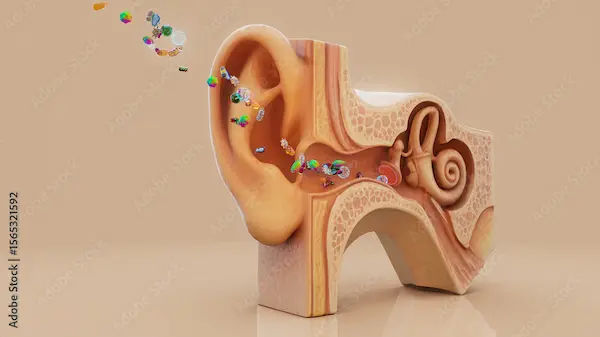Guide to Ear Infection Prevention In Monsoon
Protect your ears this monsoon with practical tips to prevent infections, maintain ear hygiene, and avoid discomfort during the rainy season.


Introduction
The pitter-patter of rain brings relief from the summer heat, but it also ushers in a season of heightened health concerns, particularly for our ears. The surge in humidity and increased exposure to water creates a perfect environment for microbes to thrive, making ear infection prevention a top priority. An infection in the ear, whether fungal or bacterial, can transform the joyful monsoon into a painful experience, causing itching, discomfort, and even temporary hearing loss. This comprehensive guide is designed to be your go-to resource for navigating the rainy season without ear troubles. We will delve into the science behind monsoon-induced ear problems, outline effective prevention strategies you can start today, and guide you on when it's crucial to seek professional medical advice. By understanding the risks and adopting simple, proactive habits, you can fully enjoy the rains while keeping your ears healthy and pain-free.
Why Are Ears More Vulnerable During the Monsoon?
The ear, especially the outer ear canal, is a delicate ecosystem. Under normal conditions, it is protected by earwax and has a slightly acidic pH that discourages microbial growth. The monsoon disrupts this balance dramatically.
The Humidity Factor: A Breeding Ground for Microbes
High humidity is the primary culprit. When the air is saturated with moisture, it prevents the natural evaporation of water and sweat from the ear canal. This trapped moisture softens the skin lining the canal and dilutes the protective earwax, creating a warm, dark, and damp environment ideal for fungi and bacteria to multiply. This is why fungal ear infections, or otomycosis, see a significant spike during this season.
Common Monsoon-Related Ear Infections (Otitis Externa vs. Otitis Media)
Two main types of infections are prevalent:
- Otitis Externa (Swimmer's Ear): This is an infection of the outer ear canal. It's often caused by water remaining in the ear after swimming or bathing, but monsoon showers and humidity can have the same effect. Symptoms typically begin with itching and progress to pain and redness.
- Otitis Media (Middle Ear Infection): While often associated with colds, this can be aggravated during monsoon due to increased respiratory infections. It involves fluid buildup behind the eardrum, causing pain and a feeling of fullness.
Consult an ENT Specialist for the best advice
Your First Line of Defense: Proactive Prevention Strategies
Effective ear infection prevention is about being consistent with a few key habits that focus on keeping the ear canal dry and intact.
Mastering the Art of Drying Your Ears
This is the single most important step. After being caught in the rain, taking a shower, or even sweating profusely, dry your ears thoroughly.
- Towel Dry: Gently dry your outer ear with a soft towel. Tilt your head to each side to help water drain out.
- Hair Dryer Technique: Use a hair dryer on the coolest setting, holding it at least a foot away from your ear for about 30 seconds. The gentle airflow is excellent for drying ears after a shower without causing damage.
- Preventive Eardrops: For those prone to infections, using over-the-counter preventive eardrops after water exposure can help. These are typically alcohol-based solutions that aid in evaporation. However, consult a doctor before using any drops if you have a perforated eardrum.
The Right (and Wrong) Way to Clean Your Ears
A common misconception is that ears need to be cleaned deeply. They are largely self-cleaning.
- Avoid Cotton Buds: Inserting cotton buds pushes earwax and debris deeper, creating a blockage and damaging the sensitive skin of the ear canal, which increases infection risk.
- Safe Cleaning: Simply wipe the outer ear with a damp cloth. Earwax is beneficial; it traps dust and bacteria. If you feel a significant wax buildup, it's safest to get it removed by a healthcare professional.
Protecting Your Ears from Contaminated Water
During the monsoon, rainwater can mix with sewage and pollutants. Avoid swimming in flooded areas or unclean
pools. If you cannot avoid exposure, consider wearing waterproof earplugs. Ensure the earplugs are clean and do not cause irritation.
Lifestyle and Immunity: Building Internal Resilience
A strong immune system is your body's best defense against any infection.
Boosting Your Immune System to Fight Infections
Incorporate a diet rich in Vitamin C (citrus fruits, bell peppers), Zinc (nuts, seeds), and antioxidants. Stay hydrated with clean, filtered water to help flush out toxins. Adequate sleep and managing stress are also crucial for maintaining robust immunity, which helps your body fight off potential ear pathogens before they take hold.
Habits to Avoid for Optimal Ear Health
- Scratching: Itchy ears are common, but scratching with fingers or objects can cause micro-abrasions, allowing infections to start.
- Sharing Personal Items: Never share towels, earphones, or earplugs, as this can transfer bacteria and fungi.
- Ignoring Allergies: Manage allergies proactively, as post-nasal drip can affect the Eustachian tube and middle ear health.
Recognising the Early Signs: Don't Ignore These Symptoms
Early detection is key to preventing a minor issue from becoming a major problem. Be alert to these symptoms of fungal ear infection and other types:
- Itching in the ear canal, which may intensify.
- Redness and swelling inside the ear.
- Pain that worsens when you tug on your outer ear.
- A feeling of fullness or blockage.
- Clear, odorless fluid or pus-like drainage.
- Muffled hearing or temporary hearing loss.
What to Do If You Suspect an Ear Infection
Ear infections can develop quickly and cause significant discomfort if not addressed promptly.
Safe Home Care Practices for Mild Discomfort
For initial itching or a feeling of water clogged ears, you can try the drying techniques mentioned above. Applying a warm (not hot) compress to the outside of the ear can help soothe mild pain. It is critical to avoid putting any oil, vinegar, or other homemade solutions into the ear without a doctor's prescription, as this can worsen the condition.
When It's Time to Seek Professional Help
Self-care has its limits. If your symptoms persist beyond two days, or if you experience severe pain, fever, significant discharge, or hearing loss, it is essential to consult a doctor. They may prescribe medicated ear drops or oral antibiotics/antifungals. Attempting to self-medicate can lead to complications, including chronic infections or hearing damage.
Conclusion
The monsoon season need not be synonymous with ear aches and infection worries. By understanding the unique challenges this weather poses and adopting a proactive approach to ear infection prevention, you can safeguard your hearing and comfort. The cornerstone of this prevention is simple: keep your ears dry, clean them wisely, and listen to your body's early warning signs. Remember that while home care is effective for mild issues, professional medical advice is irreplaceable for persistent or severe symptoms. Taking these steps will ensure that you can enjoy the refreshing rains to the fullest, without the unwelcome company of an ear infection. Stay dry, stay healthy, and if in doubt, always consult a healthcare expert.
Consult an ENT Specialist for the best advice
Consult an ENT Specialist for the best advice
Dr. Shalu Sharma
Ent Specialist
14 Years • MBBS, DLO, DNB (ENT)
Delhi
Salus Advanced ENT Care, Delhi

Dr. Sourav Banerjee
Ent Specialist
5 Years • MBBS, MS (Otorihnolaryngology)
New Delhi
THE DOCTORS NESST, New Delhi

Dr. Krishan Rajbhar
Ent Specialist
8 Years • MBBS, MS(ENT), Fellowship in Neurotology Fellowship in Middle Ear Surgery & Cochlear Implant, Fellowship in Allergy & Asthma
Kolkata
Dr. Krishan Rajbhar's Clinic, Kolkata
(150+ Patients)

Dr. M Venkata Apparao
Ent Specialist
25 Years • MBBS MS
Visakhapatnam
Apparao ENT CLINIC, Visakhapatnam

Dr. Nirupama Reddy
Ent Specialist
5 Years • MBBS, MS (Oto Rhino Laryngology)
Hyderabad
Nirupama clinic, Hyderabad
Consult an ENT Specialist for the best advice
Dr. Shalu Sharma
Ent Specialist
14 Years • MBBS, DLO, DNB (ENT)
Delhi
Salus Advanced ENT Care, Delhi

Dr. Sourav Banerjee
Ent Specialist
5 Years • MBBS, MS (Otorihnolaryngology)
New Delhi
THE DOCTORS NESST, New Delhi

Dr. Krishan Rajbhar
Ent Specialist
8 Years • MBBS, MS(ENT), Fellowship in Neurotology Fellowship in Middle Ear Surgery & Cochlear Implant, Fellowship in Allergy & Asthma
Kolkata
Dr. Krishan Rajbhar's Clinic, Kolkata
(150+ Patients)

Dr. M Venkata Apparao
Ent Specialist
25 Years • MBBS MS
Visakhapatnam
Apparao ENT CLINIC, Visakhapatnam

Dr. Nirupama Reddy
Ent Specialist
5 Years • MBBS, MS (Oto Rhino Laryngology)
Hyderabad
Nirupama clinic, Hyderabad
More articles from Ear infections and earache
Frequently Asked Questions
1. Can I use hydrogen peroxide to clean my ears during monsoon?
It's not generally recommended for routine cleaning, especially during monsoon when the ear canal skin may be softened. Hydrogen peroxide can irritate the sensitive skin and worsen an underlying infection. It should only be used if specifically advised by a doctor for a particular condition like a wax blockage.
2. Are some people more prone to monsoon ear infections?
Yes, individuals who swim frequently, have narrow ear canals, suffer from skin conditions like eczema, have diabetes, or produce excessive earwax are at a higher risk. They need to be extra vigilant with preventive measures.
3. What is the best sleeping position for an ear infection?
Sleeping with the affected ear elevated on two pillows can help reduce pressure and pain. For example, if your right ear is infected, try sleeping on your left side.
4. How long does a typical monsoon ear infection last?
With proper treatment, most outer ear infections (otitis externa) start to improve within 2-3 days and clear up completely in 7-10 days. Middle ear infections may take a similar or slightly longer time. If symptoms persist, it's important to follow up with a doctor.
5. Can I prevent ear infections in my children during the monsoon?
Absolutely. Teach children to dry their ears properly after bathing. Ensure they avoid playing in stagnant, polluted water. Keep their immunisations up-to-date and manage colds and allergies promptly, as these can lead to middle ear infections.



